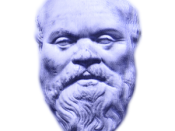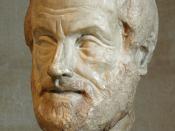Seen as a sort of excellence or virtue (or at least involving virtue) , friendship is analyzed more than any other topic in the Nicomachean Ethics. Thought of as one of the most indispensable aspects of human life, Aristotle examines friendship from a wealth of angles to show why friendship is both important and essential to a good life.
Aristotle notes that to first understand friendship, we must first learn of the different medians between which it can exist. First off, we cannot relate the concept of friendship to any inanimate object, for it lacks the capacity to reciprocate or return any affection cast unto it. Thus friendship must be seen as an exchange of affection between two living people. Aristotle states that friendship is the exchange of good will with one another, meaning that one must wish for the well being of the other. It is this notion of projected good will which is seen as the fundamental building blocks of real friendship(s).
However, good will doesn't necessarily define friendship, on account that people can express good will to complete strangers (but if good will is considered friendship, it is inactive at best). Rather, it can be seen as the beginning of friendship as over time, it can reach a point of familiarity between two people and thus develop a friendship. Also worth noting is friendships based upon what is known as concord. Aristotle doesn't attribute concord to friendship directly, but rather to that of the political domain and the friendships that arise from it. It is found in the realm of action and exists in the common interests of the many, and aimed towards the benefit of all. There are three distinct motives to take into consideration with the development of friendship, which Aristotle refers to as the...


